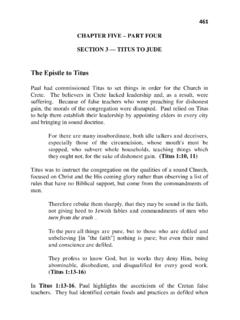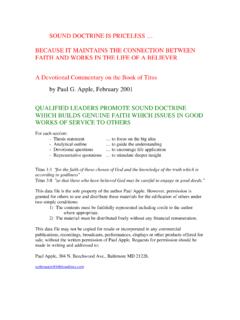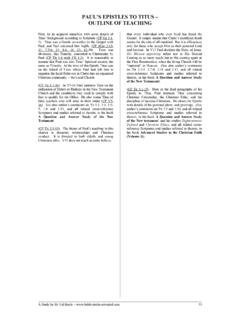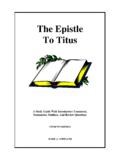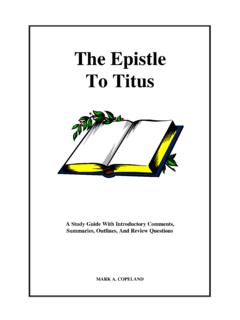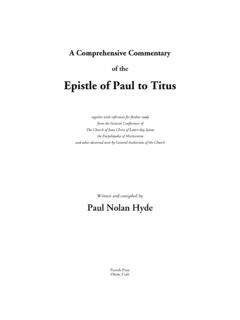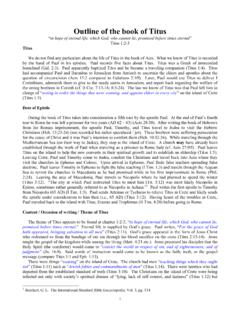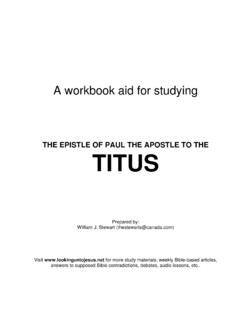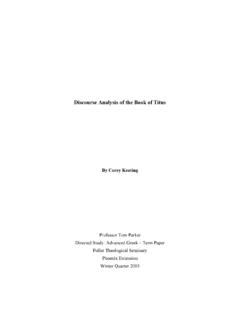Transcription of Epistle to Titus - revelation-research.org
1 Epistle to Titus Bro. Frank Shallieu (1982 Study). The following notes on the Epistle to Titus were compiled from a Bible study led by Bro. Frank Shallieu in 1982. They should be utilized with the following understanding: 1. Each paragraph preceded by Comment or Q (an abbreviation for Question ) was introduced by someone other than Bro. Frank. 2. The original study did not follow a prepared text but was extemporaneous in nature. 3. Although the transcriber tried to faithfully, with the Lord's help, set forth the thoughts that were presented in the study, the notes are not a verbatim rendering and, therefore, should be considered in that context. 4. Finally, Bro. Frank did not review the notes for possible errors that may have inadvertently entered the text. With this disclaimer in mind, may the notes be a blessing as a useful study guide. Epistle TO Titus . (Study led by Bro. Frank Shallieu in 1982). Before we begin the study of the Epistle to Titus , a little background information will be helpful.
2 We feel there was a time interval between the writing of 1 and 2 Timothy, during which the Apostle Paul wrote to Titus and Philemon. However, when the Bible was collated, Paul's two letters to Timothy were placed together instead of following the chronological sequence. The same procedure was used with 1 and 2 Thessalonians and with 1 and 2. Corinthians. Moreover, 2 Timothy 4:10, written later, gives seeming evidence that Titus forsook Paul sometime after this Epistle was written to him: For Demas hath forsaken me, having loved this present world, and is departed unto Thessalonica; .. Titus unto Dalmatia. Many Bible scholars do not give this slant but merely think that Titus left Paul to go on a mission. However, the context seems to show otherwise. How long the forsaking lasted and whether or not Titus repented we do not know, but evidently, he did forsake Paul and the ministry to a certain extent. When we read this letter to Titus , we should keep in mind that it was written in between 1 and 2 Timothy.
3 At this time, when Paul sensed that his life was terminating, he thought even more seriously and wrote to individuals (Timothy, Titus , and Philemon), and not to ecclesias (Corinthians, Romans, Colossians, etc.), although he did write the general Epistle to the Hebrews. In fact, Paul asked Timothy to bring certain things to him in prison before winter, namely, his cloak, the Scriptures, and parchments (2 Tim. 4:13). Also, Timothy was to bring Mark (2 Tim. 4:11). We believe the parchments were particularly for Paul's Epistle to the Hebrews, his crowning work. He wanted to give the parchments to Luke, who was with him. Titus 1:1 Paul, a servant of God, and an apostle of Jesus Christ, according to the faith of God's elect, and the acknowledging of the truth which is after godliness;. Part of this address is similar to what Paul said in other epistles. He called attention to his being a servant of God, and an apostle of Jesus Christ. However, the rest of verse 1, which is significant, is stated as follows in the Revised Standard.
4 To further the faith of God's elect and their knowledge of the truth which accords with godliness. God gave this direct commandment to Paul as an apostle of Jesus Christ. His responsibility was to be a help to those whom God had chosen out of the world a help in connection with their proper development of faith and knowledge. This knowledge was to be along all lines according to God's instruction and Godlikeness in mysteries as well as in character building. Titus 1:2 In hope of eternal life, which God, that cannot lie, promised before the world began;. In the Revised Standard, verse 2 reads, In hope of eternal life which God, who never lies, promised ages ago. Of course the hope for the Little Flock is immortality, but the Apostle John (and Paul here) purposely used the term eternal life, which is wonderfully to be desired. It would be a blessing to know that we had passed the test for everlasting life. Notice that God, who cannot lie, made this promise ages ago.
5 A long, long time ago, God promised the hope of eternal life, but to whom and when? Ephesians 1:4,5 provides the answers: According as he hath chosen us in him before the foundation of the world [before Adam was created], that we should be holy and without blame before him in love: Having predestinated us unto the adoption of children by Jesus Christ to himself, according to the 2. good pleasure of his will. Therefore, in God's mind even before the foundation of the world, not only was the Lamb slain, but also the Church was chosen in Christ. God wanted a divine family, so He predestinated a class to be conformed to the image of His Son (Rom. 8:29). For an infinity of time, God was alone, and His plan was secret, known only to Him. But the very fact that, in time, He created Jesus shows He had hopes and ideas with regard to that Son and a divine family. This class was predestined from time immemorial because God intended to bring many sons to glory. The fact God promised the hope of eternal life to Jesus' followers shows that while long ago He had premeditated a divine family, He also, somewhere along the line, first disclosed His purpose to Jesus.
6 Thus, before Jesus came down here as a human being at the First Advent, he knew what his mission was, but when was his mission made known? The angels shouted for joy at seeing the creation of a perfect man, a tiny physical being in God's image. But imagine their consternation when sin entered and Adam fell! We think, however, that God disclosed this information to Jesus prior to Adam's fall. God gradually confided in Jesus, telling His foreknowledge of man's sin and also part of the plan of recovery through the payment of the ransom price. The Father would have asked His Son, Would you be willing to go on this mission of mercy? A possible negation of this thinking might seem to be that Isaac did not know he was to be the sacrifice until the last moment. However, the fact that in coming to earth, Jesus did not get knowledge of his preexistence until the heavens opened to him at his baptism at age 30 could be the parallel, rather than having no prior knowledge of the purpose until that time.
7 Following his baptism, Jesus immediately went into the wilderness to reflect on and pray about what the Father had previously disclosed to him. He wanted to program his life and perform his ministry according to his Father's will. Titus 1:3 But hath in due times manifested his word through preaching, which is committed unto me according to the commandment of God our Saviour;. God hath in due times [plural] manifested his word through preaching. The King James harmonizes with the Sinaitic Manuscript, which has times (plural). The manifestation had occurred previously on multiple occasions, for at different times, the information was gradually disclosed. However, when Paul came along, he was charged with the responsibility of giving more explicit instruction and fuller enlightenment. Jesus had said to his disciples, I have yet many things to say unto you, but ye cannot bear them now (John 16:12). God commanded Paul to make known some of this information in a very pertinent manner.
8 Pieces of information were disclosed gradually down through the dispensations. For example, Enoch prophesied concerning the Second Advent that the Lord would come with ten thousands of his saints (Jude 14). Hence Enoch, who walked with God, knew a lot more than the Bible reveals about him (Gen. 5:22). Moses knew about the sufferings of Christ and was willing to suffer for the cause of Messiah in advance of the First Advent (Heb. 11:24-26). Abraham saw my [Jesus'] day and rejoiced (John 8:56). Also, he and other Ancient Worthies died in faith and endured sufferings with the hope of a better country, that is, an heavenly [resurrection] (Heb. 11:10,13,16). To repeat, the Ancient Worthies had a spiritual hope, to be realized ultimately, at the conclusion of the Millennial Age. Of course they will start out with a better resurrection at the beginning of the Kingdom Age, in that they will be perfect bodily beings, but at the end of the Millennium, all of mankind who get life will also be perfect.
9 Therefore, the better resurrection of the Ancient Worthies will logically be a change to spirit nature at that time as an additional reward. The term camp of the saints suggests that the Ancient Worthies will have another residence, a more permanent abode, elsewhere at that time (Rev. 20:9). 3. Therefore, God's manifesting His word in due times through preaching means that just as Enoch prophesied before the Flood, so others prophesied after the Flood but piecemeal, in dribs and drabs. Now Paul came along and said that he had been charged with the responsibility to enlarge the faith and understanding of Christians on these matters. Which is committed unto me according to the commandment of God our Saviour. Paul was commanded to preach in connection with seeing Jesus as one born out of due time and the sending of Ananias to partially restore his eyesight (Acts 9:1-20; 1 Cor. 15:8). God told Ananias that Paul was chosen to preach before kings, Gentiles, and Jews, and the apostle subsequently received instruction from Ananias.
10 Titus 1:4 To Titus , mine own son after the common faith: Grace, mercy, and peace, from God the Father and the Lord Jesus Christ our Saviour. To Titus , mine own son [child see RSV] after the common faith. Child seems to be the proper thought, suggesting that Titus was converted after hearing Paul. The term common faith is the high calling and thus is a proof that the common salvation of Jude 3 is also the high calling. Grace, mercy, and peace, from God the Father and the Lord Jesus Christ our Saviour. Most new translations properly omit the word mercy. The Diaglott contains mercy, but it was supplied from a later manuscript. Incidentally, in the Diaglott, part of Timothy and all of Titus , Philemon, Hebrews, and Revelation are supplied from later manuscripts. Titus 1:5 For this cause left I thee in Crete, that thou shouldest set in order the things that are wanting, and ordain elders in every city, as I had appointed thee: When did Paul leave Titus on the island of Crete?

